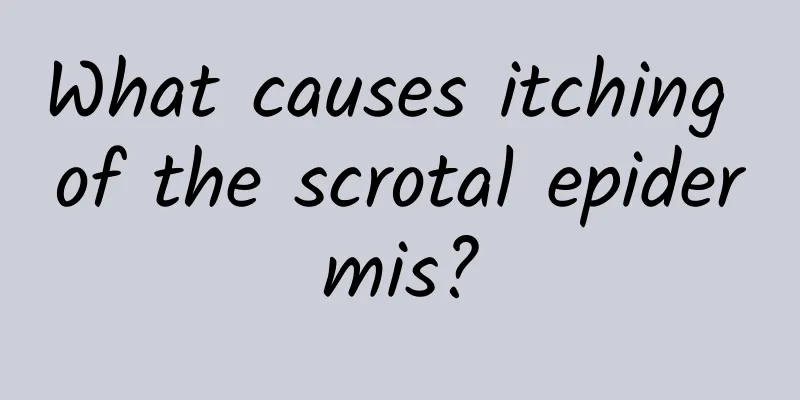What is convulsion? These clinical manifestations are all considered convulsions!

|
Occasional twitching is a "self" reaction of the muscles. It is a normal phenomenon and you don't need to worry too much. If a man twitches frequently, it may be a disease. However, many men don't know much about this disease. It doesn't matter. Today, let's talk about what twitching is and what are its clinical manifestations. 1. Systemic tonic convulsions: The muscles of the whole body are rigid and twitching, with opisthotonos (the head is tilted back and the whole body is bent backward in a bow shape), the eyes are rolled up or staring, and the patient is unconscious. 2. Localized convulsions: Only local muscle twitching, such as twitching of only one side of the limb, or twitching of facial muscles, or twitching of fingers and toes, or eye movement, nystagmus, blinking, staring, etc. Most of them are unconscious. The above convulsions can last for a few seconds or minutes, and in severe cases, they can last for several minutes or recur. Seizures lasting more than 30 minutes are called continuous state of convulsion. 3. High fever and syncope: It is mainly seen in children aged 6 months to 4 years who have convulsions during high fever. The high fever convulsion is short-lived, and consciousness recovers quickly after the convulsion. It often occurs in the early stage of fever. In a fever, there is often only one convulsion. Brain diseases and other serious diseases can be ruled out, and the EEG is normal one week after the fever subsides. Category Shock: It is a common involuntary movement, which is a tonic and convulsive convulsion of the whole body or local muscle groups. It can be generalized like epileptic seizures and localized like focal seizures. Seizures may be accompanied by or without impaired consciousness. Tonic spasm: It refers to a tonic contraction of muscles, such as the tonic phase of a grand mal seizure, the intramuscular spasms of the hands and feet in tetany, and the lockjaw and opisthotonos in tetanus. Muscle spasms: A short, rapid, electric shock-like, repetitive muscle contraction may occur in several muscle groups or in some muscles. A myoclonus may be so mild that it does not cause movement of a part of the body, or it may be so violent that the patient falls. Tremor: It is a rhythmic alternating movement of the agonist and antagonist muscles of the joints. The amplitude can be large or small, and the speed can be fast or slow, depending on the disease. Common parts of tremor are the fingers, jaw, lips and head. Dance-like movements: It is a sudden, rapid, amorphous, purposeless, coarse muscle twitching, most commonly seen in the head, face and upper limbs, especially the distal ends of the limbs. Athetosis: It refers to the relatively slow twisting movement of the fingers or toes, which manifests in various strange shapes and its speed is between dance movements and torso spasms. Torsion spasm: It is a slow twisting movement of the proximal limbs and spinal muscles, also caused by basal ganglia disease. Fasciculation is an extremely rapid and brief contraction limited to certain muscle bundles, without joint movement, which can be induced by manual stimulation of the affected area. |
<<: Why does a man's penis turn black? Four reasons you need to know
>>: How to lose weight on the buttocks? Five steps to buttocks massage
Recommend
How to regulate the prostate
Whether you are a boy or a girl, you will encount...
What are the symptoms of testicular rupture?
The testicles are one of the most important organ...
What causes a boy's scrotum to be wet?
Most men have scrotal moisture due to kidney defi...
What to do if there are blisters on the foreskin
Long foreskin is a common problem among men. Men ...
Treatment of acute superficial balanitis
With the continuous progress of society, many peo...
Why can't I ejaculate during sex?
Sexual life is a very relaxing thing for some peo...
Are kidney-tonifying drugs harmful to the body?
Kidney deficiency is a situation that we often en...
How to treat oligospermia_What to do if men have oligospermia
Oligospermia can lead to male infertility. I hope...
What to do about irritability during menopause? Men can adjust their diet like this
Menopause is also a disease that should not be un...
At what age does a man's sexual function begin to decline?
Sexual function is everyone's instinct. Only ...
Normal length of male genitals
Every man is particularly concerned about the len...
What is scrotal peeling?
Scrotal peeling is a common disease among men. Be...
Post-circumcision care
Circumcision is a surgery that many male friends ...
What is the normal prostate size?
The prostate is closely related to our physical h...
Several ways for men to lose weight
Obesity has become a big problem that troubles ma...









